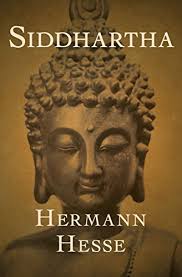Siddhartha Page #18
Siddhartha is a novel by Hermann Hesse that deals with the spiritual journey of self-discovery of a man named Siddhartha during the time of the Gautama Buddha. The book, Hesse's ninth novel, was written in German, in a simple, lyrical style.
BY THE RIVER Siddhartha walked through the forest, was already far from the city, and knew nothing but that one thing, that there was no going back for him, that this life, as he had lived it for many years until now, was over and done away with, and that he had tasted all of it, sucked everything out of it until he was disgusted with it. Dead was the singing bird, he had dreamt of. Dead was the bird in his heart. Deeply, he had been entangled in Sansara, he had sucked up disgust and death from all sides into his body, like a sponge sucks up water until it is full. And full he was, full of the feeling of been sick of it, full of misery, full of death, there was nothing left in this world which could have attracted him, given him joy, given him comfort. Passionately he wished to know nothing about himself anymore, to have rest, to be dead. If there only was a lightning-bolt to strike him dead! If there only was a tiger a devour him! If there only was a wine, a poison which would numb his senses, bring him forgetfulness and sleep, and no awakening from that! Was there still any kind of filth, he had not soiled himself with, a sin or foolish act he had not committed, a dreariness of the soul he had not brought upon himself? Was it still at all possible to be alive? Was it possible, to breathe in again and again, to breathe out, to feel hunger, to eat again, to sleep again, to sleep with a woman again? Was this cycle not exhausted and brought to a conclusion for him? Siddhartha reached the large river in the forest, the same river over which a long time ago, when he had still been a young man and came from the town of Gotama, a ferryman had conducted him. By this river he stopped, hesitantly he stood at the bank. Tiredness and hunger had weakened him, and whatever for should he walk on, wherever to, to which goal? No, there were no more goals, there was nothing left but the deep, painful yearning to shake off this whole desolate dream, to spit out this stale wine, to put an end to this miserable and shameful life. A hang bent over the bank of the river, a coconut-tree; Siddhartha leaned against its trunk with his shoulder, embraced the trunk with one arm, and looked down into the green water, which ran and ran under him, looked down and found himself to be entirely filled with the wish to let go and to drown in these waters. A frightening emptiness was reflected back at him by the water, answering to the terrible emptiness in his soul. Yes, he had reached the end. There was nothing left for him, except to annihilate himself, except to smash the failure into which he had shaped his life, to throw it away, before the feet of mockingly laughing gods. This was the great vomiting he had longed for: death, the smashing to bits of the form he hated! Let him be food for fishes, this dog Siddhartha, this lunatic, this depraved and rotten body, this weakened and abused soul! Let him be food for fishes and crocodiles, let him be chopped to bits by the daemons! With a distorted face, he stared into the water, saw the reflection of his face and spit at it. In deep tiredness, he took his arm away from the trunk of the tree and turned a bit, in order to let himself fall straight down, in order to finally drown. With his eyes closed, he slipped towards death. Then, out of remote areas of his soul, out of past times of his now weary life, a sound stirred up. It was a word, a syllable, which he, without thinking, with a slurred voice, spoke to himself, the old word which is the beginning and the end of all prayers of the Brahmans, the holy "Om", which roughly means "that what is perfect" or "the completion". And in the moment when the sound of "Om" touched Siddhartha's ear, his dormant spirit suddenly woke up and realized the foolishness of his actions. Siddhartha was deeply shocked. So this was how things were with him, so doomed was he, so much he had lost his way and was forsaken by all knowledge, that he had been able to seek death, that this wish, this wish of a child, had been able to grow in him: to find rest by annihilating his body! What all agony of these recent times, all sobering realizations, all desperation had not brought about, this was brought on by this moment, when the Om entered his consciousness: he became aware of himself in his misery and in his error. Om! he spoke to himself: Om! and again he knew about Brahman, knew about the indestructibility of life, knew about all that is divine, which he had forgotten. But this was only a moment, flash. By the foot of the coconut-tree, Siddhartha collapsed, struck down by tiredness, mumbling Om, placed his head on the root of the tree and fell into a deep sleep. Deep was his sleep and without dreams, for a long time he had not known such a sleep any more. When he woke up after many hours, he felt as if ten years had passed, he heard the water quietly flowing, did not know where he was and who had brought him here, opened his eyes, saw with astonishment that there were trees and the sky above him, and he remembered where he was and how he got here. But it took him a long while for this, and the past seemed to him as if it had been covered by a veil, infinitely distant, infinitely far away, infinitely meaningless. He only knew that his previous life (in the first moment when he thought about it, this past life seemed to him like a very old, previous incarnation, like an early pre-birth of his present self)--that his previous life had been abandoned by him, that, full of disgust and wretchedness, he had even intended to throw his life away, but that by a river, under a coconut-tree, he has come to his senses, the holy word Om on his lips, that then he had fallen asleep and had now woken up and was looking at the world as a new man. Quietly, he spoke the word Om to himself, speaking which he had fallen asleep, and it seemed to him as if his entire long sleep had been nothing but a long meditative recitation of Om, a thinking of Om, a submergence and complete entering into Om, into the nameless, the perfected. What a wonderful sleep had this been! Never before by sleep, he had been thus refreshed, thus renewed, thus rejuvenated! Perhaps, he had really died, had drowned and was reborn in a new body? But no, he knew himself, he knew his hand and his feet, knew the place where he lay, knew this self in his chest, this Siddhartha, the eccentric, the weird one, but this Siddhartha was nevertheless transformed, was renewed, was strangely well rested, strangely awake, joyful and curious.
Translation
Translate and read this book in other languages:
Select another language:
- - Select -
- 简体中文 (Chinese - Simplified)
- 繁體中文 (Chinese - Traditional)
- Español (Spanish)
- Esperanto (Esperanto)
- 日本語 (Japanese)
- Português (Portuguese)
- Deutsch (German)
- العربية (Arabic)
- Français (French)
- Русский (Russian)
- ಕನ್ನಡ (Kannada)
- 한국어 (Korean)
- עברית (Hebrew)
- Gaeilge (Irish)
- Українська (Ukrainian)
- اردو (Urdu)
- Magyar (Hungarian)
- मानक हिन्दी (Hindi)
- Indonesia (Indonesian)
- Italiano (Italian)
- தமிழ் (Tamil)
- Türkçe (Turkish)
- తెలుగు (Telugu)
- ภาษาไทย (Thai)
- Tiếng Việt (Vietnamese)
- Čeština (Czech)
- Polski (Polish)
- Bahasa Indonesia (Indonesian)
- Românește (Romanian)
- Nederlands (Dutch)
- Ελληνικά (Greek)
- Latinum (Latin)
- Svenska (Swedish)
- Dansk (Danish)
- Suomi (Finnish)
- فارسی (Persian)
- ייִדיש (Yiddish)
- հայերեն (Armenian)
- Norsk (Norwegian)
- English (English)
Citation
Use the citation below to add this book to your bibliography:
Style:MLAChicagoAPA
"Siddhartha Books." Literature.com. STANDS4 LLC, 2024. Web. 23 Nov. 2024. <https://www.literature.com/book/siddhartha_24>.




Discuss this Siddhartha book with the community:
Report Comment
We're doing our best to make sure our content is useful, accurate and safe.
If by any chance you spot an inappropriate comment while navigating through our website please use this form to let us know, and we'll take care of it shortly.
Attachment
You need to be logged in to favorite.
Log In